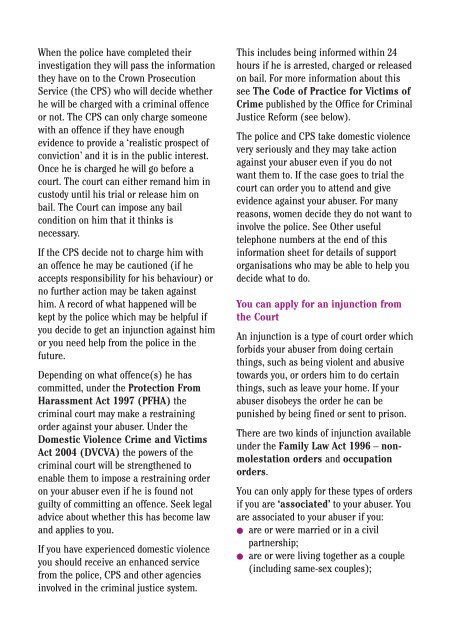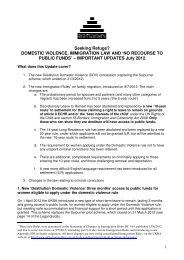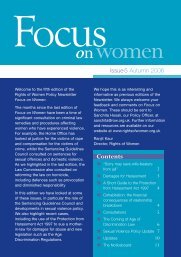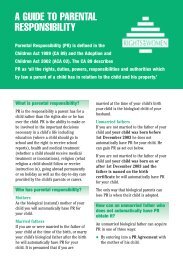domestic violence -pn2415 - Rights of Women
domestic violence -pn2415 - Rights of Women
domestic violence -pn2415 - Rights of Women
Create successful ePaper yourself
Turn your PDF publications into a flip-book with our unique Google optimized e-Paper software.
When the police have completed their<br />
investigation they will pass the information<br />
they have on to the Crown Prosecution<br />
Service (the CPS) who will decide whether<br />
he will be charged with a criminal <strong>of</strong>fence<br />
or not. The CPS can only charge someone<br />
with an <strong>of</strong>fence if they have enough<br />
evidence to provide a ‘realistic prospect <strong>of</strong><br />
conviction’ and it is in the public interest.<br />
Once he is charged he will go before a<br />
court. The court can either remand him in<br />
custody until his trial or release him on<br />
bail. The Court can impose any bail<br />
condition on him that it thinks is<br />
necessary.<br />
If the CPS decide not to charge him with<br />
an <strong>of</strong>fence he may be cautioned (if he<br />
accepts responsibility for his behaviour) or<br />
no further action may be taken against<br />
him. A record <strong>of</strong> what happened will be<br />
kept by the police which may be helpful if<br />
you decide to get an injunction against him<br />
or you need help from the police in the<br />
future.<br />
Depending on what <strong>of</strong>fence(s) he has<br />
committed, under the Protection From<br />
Harassment Act 1997 (PFHA) the<br />
criminal court may make a restraining<br />
order against your abuser. Under the<br />
Domestic Violence Crime and Victims<br />
Act 2004 (DVCVA) the powers <strong>of</strong> the<br />
criminal court will be strengthened to<br />
enable them to impose a restraining order<br />
on your abuser even if he is found not<br />
guilty <strong>of</strong> committing an <strong>of</strong>fence. Seek legal<br />
advice about whether this has become law<br />
and applies to you.<br />
If you have experienced <strong>domestic</strong> <strong>violence</strong><br />
you should receive an enhanced service<br />
from the police, CPS and other agencies<br />
involved in the criminal justice system.<br />
This includes being informed within 24<br />
hours if he is arrested, charged or released<br />
on bail. For more information about this<br />
see The Code <strong>of</strong> Practice for Victims <strong>of</strong><br />
Crime published by the Office for Criminal<br />
Justice Reform (see below).<br />
The police and CPS take <strong>domestic</strong> <strong>violence</strong><br />
very seriously and they may take action<br />
against your abuser even if you do not<br />
want them to. If the case goes to trial the<br />
court can order you to attend and give<br />
evidence against your abuser. For many<br />
reasons, women decide they do not want to<br />
involve the police. See Other useful<br />
telephone numbers at the end <strong>of</strong> this<br />
information sheet for details <strong>of</strong> support<br />
organisations who may be able to help you<br />
decide what to do.<br />
You can apply for an injunction from<br />
the Court<br />
An injunction is a type <strong>of</strong> court order which<br />
forbids your abuser from doing certain<br />
things, such as being violent and abusive<br />
towards you, or orders him to do certain<br />
things, such as leave your home. If your<br />
abuser disobeys the order he can be<br />
punished by being fined or sent to prison.<br />
There are two kinds <strong>of</strong> injunction available<br />
under the Family Law Act 1996 – nonmolestation<br />
orders and occupation<br />
orders.<br />
You can only apply for these types <strong>of</strong> orders<br />
if you are ‘associated’ to your abuser. You<br />
are associated to your abuser if you:<br />
● are or were married or in a civil<br />
partnership;<br />
● are or were living together as a couple<br />
(including same-sex couples);
















